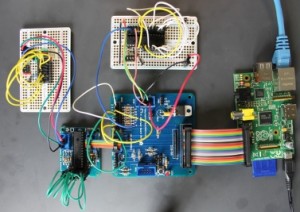Minibloq - a graphical programming environment for the Arduino
We're seeing a great and welcome upsurge of interest in introducing school children to programming, rather than just teaching them how to use Powerpoint, Word and Excel.
- Jason Gorman got programmers and teachers together at Bletchley Park this Summer to look at ways of bringing programming into Schools
- RaspberryPi, inspired by the success of the BBC micro in the '80s is aiming to fire up the next generation of school-age programmers
- the Arduino, along with introductory kits like Oomlout's experimenters kit has made the Internet of Things accessible to beginners of any age
- MIT's Scratch has children and adults creating their own interactive stories, games, music and art
And now there's Minibloq.
Minibloq
The Arduino blog recently announced Minibloq v0.8 - a visual programming environment for the Arduino. It's aimed at the creative at heart non-programmers, and I couldn't resist a play. (I leave it to those with whom I've developed software to decide whether or not I meet the criterion.)
The software has been developed under Windows, which is appropriate for the intended audience. My study is normally a windows-free zone; I could have installed Wine (the software that allows you to run a lot of Windows Software under Linux), but it seemed simpler to fire up a VirtualBox VM running Windows XP.
Once I'd done so, it took a minute or so to download the 72Mbyte package, and a couple of minutes to write a simple led flashing program. I have to confess I didn't read the documentation, but the interface is intuitive enough that I didn't need to.
There are plenty of examples on the website, and a demo video on the blog. Minibloq is fun, and I intend to play with it some more over the next few days.
One of the features I like best is that you can ask to see the code that's being generated as you develop your program. The visual interface is very accessible, but when you're ready Minibloq will help you transition painlessly to text-based programming.
Congratulations to the Minbloq team. Great work. We'll hear more about this software.




Comments
Post a Comment